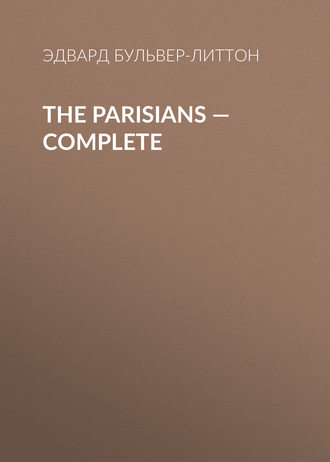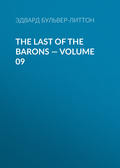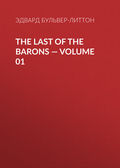
Эдвард Бульвер-Литтон
The Parisians — Complete
“Don’t believe all that Monsieur Georges so flatteringly says of me,” put in M. Lebeau, with a modest half-smile, and in English. “I should tell you that I, like yourself, am recently arrived at Paris, having bought the business and goodwill of my predecessor in the apartment I occupy; and it is only to the respect due to his antecedents, and on the score of a few letters of recommendation which I bring from Lyons, that I can attribute the confidence shown to me, a stranger in this neighbourhood. Still I have some knowledge of the world, and I am always glad if I can be of service to the English. I love the English”—he said this with a sort of melancholy earnestness which seemed sincere; and then added in a more careless tone,—“I have met with much kindness from them in the course of a chequered life.”
“You seem a very good fellow,—in fact, a regular trump, Monsieur Lebeau,” replied Graham, in the same language. “Give me your address. To say truth, I am a very poor French scholar, as you must have seen, and am awfully bother-headed how to manage some correspondence on matters with which I am entrusted by my employer, so that it is a lucky chance which has brought me acquainted with you.”
M. Lebeau inclined his head gracefully, and drew from a very neat morocco case a card, which Graham took and pocketed. Then he paid for his coffee and lemonade, and returned home well satisfied with the evening’s adventure.
CHAPTER VII
The next morning Graham sent for M. Renard, and consulted with that experienced functionary as to the details of the plan of action which he had revolved during the hours of a sleepless night.
“In conformity with your advice,” said he, “not to expose myself to the chance of future annoyance, by confiding to a man so dangerous as the false Lebeau my name and address, I propose to take the lodging offered to me, as Mr. Lamb, an attorney’s clerk, commissioned to get in certain debts, and transact other matters of business, on behalf of his employer’s clients. I suppose there will be no difficulty with the police in this change of name, now that passports for the English are not necessary?”
“Certainly not. You will have no trouble in that respect.”
“I shall thus be enabled very naturally to improve acquaintance with the professional letter-writer, and find an easy opportunity to introduce the name of Louise Duval. My chief difficulty, I fear, not being a practical actor, will be to keep up consistently the queer sort of language I have adopted, both in French and in English. I have too sharp a critic in a man so consummate himself in stage trick and disguise as M. Lebeau not to feel the necessity of getting through my role as quickly as I can. Meanwhile, can you recommend me to some magasin where I can obtain a suitable change of costume? I can’t always wear a travelling suit, and I must buy linen of coarser texture than mine, and with the initials of my new name inscribed on it.”
“Quite right to study such details; I will introduce you to a magasin near the Temple, where you will find all you want.”
“Next, have you any friends or relations in the provinces unknown to M. Lebeau, to whom I might be supposed to write about debts or business matters, and from whom I might have replies?”
“I will think over it, and manage that for you very easily. Your letters shall find their way to me, and I will dictate the answers.”
After some further conversation on that business, M. Renard made an appointment to meet Graham at a cafe near the Temple later in the afternoon, and took his departure.
Graham then informed his laquais de place that, though he kept on his lodgings, he was going into the country for a few days, and should not want the man’s services till he returned. He therefore dismissed and paid him off at once, so that the laquais might not observe, when he quitted his rooms the next day, that he took with him no change of clothes, etc.
CHAPTER VIII
Graham Vane has been for some days in the apartment rented of M. Georges. He takes it in the name of Mr. Lamb,—a name wisely chosen, less common than Thompson and Smith, less likely to be supposed an assumed name, yet common enough not to be able easily to trace it to any special family. He appears, as he had proposed, in the character of an agent employed by a solicitor in London to execute sundry commissions and to collect certain outstanding debts. There is no need to mention the name of the solicitor; if there were, he could give the name of his own solicitor, to whose discretion he could trust implicitly. He dresses and acts up to his assumed character with the skill of a man who, like the illustrious Charles Fox, has, though in private representations, practised the stage-play in which Demosthenes said the triple art of oratory consisted; who has seen a great deal of the world, and has that adaptability of intellect which knowledge of the world lends to one who is so thoroughly in earnest as to his end that he agrees to be sportive as to his means.
The kind of language he employs when speaking English to Lebeau is that suited to the role of a dapper young underling of vulgar mind habituated to vulgar companionships. I feel it due, if not to Graham himself, at least to the memory of the dignified orator whose name he inherits, so to modify and soften the hardy style of that peculiar diction in which he disguises his birth and disgraces his culture, that it is only here and there that I can venture to indicate the general tone of it; but in order to supply my deficiencies therein, the reader has only to call to mind the forms of phraseology which polite novelists in vogue, especially young-lady novelists, ascribe to well-born gentlemen, and more emphatically to those in the higher ranks of the Peerage. No doubt Graham, in his capacity of critic, had been compelled to read, in order to review, those contributions to refined literature, and had familiarized himself to a vein of conversation abounding with “swell” and “stunner” and “awfully jolly,” in its libel on manners and outrage on taste.
He has attended nightly the cafe Jean Jacques; he has improved acquaintance with M. Georges and M. Lebeau; he has played at billiards, he has played at dominos, with the latter. He has been much surprised at the unimpeachable honesty which M. Lebeau has exhibited in both these games. In billiards, indeed, a man cannot cheat except by disguising his strength; it is much the same in dominos,—it is skill combined with luck, as in whist; but in whist there are modes of cheating which dominos do not allow,—you can’t mark a domino as you can a card. It was perfectly clear to Graham that M. Lebeau did not gain a livelihood by billiards or dominos at the cafe Jean Jacques. In the former he was not only a fair but a generous player. He played exceedingly well, despite his spectacles; but he gave, with something of a Frenchman’s lofty fanfaronnade, larger odds to his adversary than his play justified. In dominos, where such odds could not well be given, he insisted on playing such small stakes as two or three francs might cover. In short, M. Lebeau puzzled Graham. All about M. Lebeau, his manner, his talk, was irreproachable, and baffled suspicion; except in this,—Graham gradually discovered that the cafe had a quasi-political character. Listening to talkers round him, he overheard much that might well have shocked the notions of a moderate Liberal; much that held in disdain the objects to which, in 1869, an English Radical directed his aspirations. Vote by ballot, universal suffrage, etc.,—such objects the French had already attained. By the talkers at the cafe Jean Jacques they were deemed to be the tricky contrivances of tyranny. In fact, the talk was more scornful of what Englishmen understand by radicalism or democracy than Graham ever heard from the lips of an ultra-Tory. It assumed a strain of philosophy far above the vulgar squabbles of ordinary party politicians,—a philosophy which took for its fundamental principles the destruction of religion and of private property. These two objects seemed dependent the one on the other. The philosophers of the Jean Jacques held with that expounder of Internationalism, Eugene Dupont, “Nous ne voulons plus de religion, car les religions etouffent l’intelligence.”
[Discours par Eugene Dupont a la Cloture du Congres de Bruxelles, Sept. 3, 1868]
Now and then, indeed, a dissentient voice was raised as to the existence of a Supreme Being, but, with one exception, it soon sank into silence. No voice was raised in defence of private property. These sages appeared for the most part to belong to the class of ouvriers or artisans. Some of them were foreigners,—Belgian, German, English; all seemed well off for their calling. Indeed they must have had comparatively high wages, to judge by their dress and the money they spent on regaling themselves. The language of several was well chosen, at times eloquent. Some brought with them women who seemed respectable, and who often joined in the conversation, especially when it turned upon the law of marriage as a main obstacle to all personal liberty and social improvement. If this was a subject on which the women did not all agree, still they discussed it, without prejudice and with admirable sang froid. Yet many of them looked like wives and mothers. Now and then a young journeyman brought with him a young lady of more doubtful aspect, but such a couple kept aloof from the others. Now and then, too, a man evidently of higher station than that of ouvrier, and who was received by the philosophers with courtesy and respect, joined one of the tables and ordered a bowl of punch for general participation. In such occasional visitors, Graham, still listening, detected a writer of the press; now and then, a small artist or actor or medical student. Among the habitues there was one man, an ouvrier, in whom Graham could not help feeling an interest. He was called Monnier, sometimes more familiarly Armand, his baptismal appellation. This man had a bold and honest expression of countenance. He talked like one who, if he had not read much, had thought much on the subjects he loved to discuss. He argued against the capital of employers quite as ably as Mr. Mill has argued against the rights of property in land. He was still more eloquent against the laws of marriage and Heritage. But his was the one voice not to be silenced in favour of a Supreme Being. He had at least the courage of his opinions, and was always thoroughly in earnest. M. Lebeau seemed to know this man, and honoured him with a nod and a smile, when passing by him to the table he generally occupied. This familiarity with a man of that class, and of opinions so extreme, excited Graham’s curiosity. One evening he said to Lebeau, “A queer fellow that you have just nodded to.
“How so?”
“Well, he has queer notions.”
“Notions shared, I believe, by many of your countrymen?”
“I should think not many. Those poor simpletons yonder may have caught ‘em from their French fellow-workmen, but I don’t think that even the gobemouches in our National Reform Society open their mouths to swallow such wasps.”
“Yet I believe the association to which most of those ouvriers belong had its origin in England.”
“Indeed! what association?”
“The International.”
“Ah, I have heard of that.”
Lebeau turned his green spectacles full on Graham’s face as he said slowly, “And what do you think of it?”
Graham prudently checked the disparaging reply that first occurred to him, and said, “I know so little about it that I would rather ask you.”
“I think it might become formidable if it found able leaders who knew how to use it. Pardon me, how came you to know of this cafe? Were you recommended to it?”
“No; I happened to be in this neighbourhood on business, and walked in, as I might into any other cafe.”
“You don’t interest yourself in the great social questions which are agitated below the surface of this best of all possible worlds?”
“I can’t say that I trouble my head much about them.”
“A game at dominos before M. Georges arrives?”
“Willingly. Is M. Georges one of those agitators below the surface?”
“No, indeed. It is for you to play.”
Here M. Georges arrived, and no further conversation on political or social questions ensued.
Graham had already called more than once at M. Lebeau’s office, and asked him to put into good French various letters on matters of business, the subjects of which had been furnished by M. Renard. The office was rather imposing and stately, considering the modest nature of M. Lebeau’s ostensible profession. It occupied the entire ground-floor of a corner house, with a front-door at one angle and a back-door at the other. The anteroom to his cabinet, and in which Graham had generally to wait some minutes before he was introduced, was generally well filled, and not only by persons who, by their dress and outward appearance, might be fairly supposed sufficiently illiterate to require his aid as polite letter-writers,—not only by servant-maids and grisettes, by sailors, zouaves, and journeymen workmen,—but not unfrequently by clients evidently belonging to a higher, or at least a richer, class of society,—men with clothes made by a fashionable tailor; men, again, who, less fashionably attired; looked like opulent tradesmen and fathers of well-to-do families,—the first generally young, the last generally middle-aged. All these denizens of a higher world were introduced by a saturnine clerk into M. Lebeau’s reception-room, very quickly and in precedence of the ouvriers and grisettes.
“What can this mean?” thought Graham; “is it really that this humble business avowed is the cloak to some political conspiracy concealed,—the International Association?” And so pondering, the clerk one day singled him from the crowd and admitted him into M. Lebeau’s cabinet. Graham thought the time had now arrived when he might safely approach the subject that had brought him to the Faubourg Montmartre.
“You are very good,” said Graham, speaking in the English of a young earl in our elegant novels,—“you are very good to let me in while you have so many swells and nobs waiting for you in the other room. But, I say, old fellow, you have not the cheek to tell me that they want you to correct their cocker or spoon for them by proxy?”
“Pardon me,” answered M. Lebeau in French, “if I prefer my own language in replying to you. I speak the English I learned many years ago, and your language in the beau monde, to which you evidently belong, is strange to me. You are quite right, however, in your surmise that I have other clients than those who, like yourself, think I could correct their verbs or their spelling. I have seen a great deal of the world,—I know something of it, and something of the law; so that many persons come to me for advice and for legal information on terms more moderate than those of an avoue. But my ante-chamber is full, I am pressed for time; excuse me if I ask you to say at once in what I can be agreeable to you to-day.”
“Ah!” said Graham, assuming a very earnest look, “you do know the world, that is clear; and you do know the law of France, eh?”
“Yes, a little.”
“What I wanted to say at present may have something to do with French law, and I meant to ask you either to recommend to me a sharp lawyer, or to tell me how I can best get at your famous police here.”
“Police?”
“I think I may require the service of one of those officers whom we in England call detectives; but if you are busy now, I can call to-morrow.”
“I spare you two minutes. Say at once, dear Monsieur, what you want with law or police.”
“I am instructed to find out the address of a certain Louise Duval, daughter of a drawing-master named Adolphe Duval, living in the Rue ——in the year 1848.”
Graham, while he thus said, naturally looked Lebeau in the face,—not pryingly, not significantly, but as a man generally does look in the face the other man whom he accosts seriously. The change in the face he regarded was slight, but it was unmistakable. It was the sudden meeting of the eyebrows, accompanied with the sudden jerk of the shoulder and bend of the neck, which betoken a man taken by surprise, and who pauses to reflect before he replies. His pause was but momentary,
“For what object is this address required?”
“That I don’t know; but evidently for some advantage to Madame or Mademoiselle Duval, if still alive, because my employer authorizes me to spend no less than L100 in ascertaining where she is, if alive, or where she was buried, if dead; and if other means fail, I am instructed to advertise to the effect that if Louise Duval, or, in case of her death, any children of hers living in the year 1849, will communicate with some person whom I may appoint at Paris, such intelligence, authenticated, may prove to the advantage of the party advertised for. I am, however, told not to resort to this means without consulting either with a legal adviser or the police.”
“Hem! have you inquired at the house where this lady was, you say, living in 1848?”
“Of course I have done that; but very clumsily, I dare say, through a friend, and learned nothing. But I must not keep you now. I think I shall apply at once to the police. What should I say when I get to the bureau?”
“Stop, Monsieur, stop. I do not advise you to apply to the police. It would be waste of time and money. Allow me to think over the matter. I shall see you this evening at the cafe Jean Jacques at eight o’clock. Till then do nothing.”
“All right; I obey you. The whole thing is out of my way of business awfully. Bonjour.”
CHAPTER IX
Punctually at eight o’clock Graham Vane had taken his seat at a corner table at the remote end of the cafe Jean Jacques, called for his cup of coffee and his evening journal, and awaited the arrival of M. Lebeau. His patience was not tasked long. In a few minutes the Frenchman entered, paused at the comptoir, as was his habit, to address a polite salutation to the well-dressed lady who there presided, nodded as usual to Armand Monnier, then glanced round, recognized Graham with a smile, and approached his table with the quiet grace of movement by which he was distinguished.
Seating himself opposite to Graham, and speaking in a voice too low to be heard by others, and in French, he then said,
“In thinking over your communication this morning, it strikes me as probable, perhaps as certain, that this Louise Duval or her children, if she have any, must be entitled to some moneys bequeathed to her by a relation or friend in England. What say you to that assumption, Monsieur Lamb?”
“You are a sharp fellow,” answered Graham. “Just what I say to myself. Why else should I be instructed to go to such expense in finding her out? Most likely, if one can’t trace her, or her children born before the date named, any such moneys will go to some one else; and that some one else, whoever he be, has commissioned my employer to find out. But I don’t imagine any sum due to her or her heirs can be much, or that the matter is very important; for, if so, the thing would not be carelessly left in the hands of one of the small fry like myself, and clapped in along with a lot of other business as an off-hand job.”
“Will you tell me who employed you?”
“No, I don’t feel authorized to do that at present; and I don’t see the necessity of it. It seems to me, on consideration, a matter for the police to ferret out; only, as I asked before, how should I get at the police?”
“That is not difficult. It is just possible that I might help you better than any lawyer or any detective.”
“Why, did you ever know this Louise Duval?”
“Excuse me, Monsieur Lamb; you refuse me your full confidence; allow me to imitate your reserve.”
“Oho!” said Graham; “shut up as close as you like; it is nothing to me. Only observe, there is this difference between us, that I am employed by another. He does not authorize me to name him, and if I did commit that indiscretion, I might lose my bread and cheese. Whereas you have nobody’s secret to guard but your own, in saying whether or not you ever knew a Madame or Mademoiselle Duval; and if you have some reason for not getting me the information I am instructed to obtain, that is also a reason for not troubling you further. And after all, old boy” (with a familiar slap on Lebeau’s stately shoulder), “after all, it is I who would employ you; you don’t employ me. And if you find out the lady, it is you who would get the L100., not I.”
M. Lebeau mechanically brushed, with a light movement of hand, the shoulder which the Englishman had so pleasantly touched, drew himself and chair some inches back, and said slowly,—
“Monsieur Lamb, let us talk as gentleman to gentleman. Put aside the question of money altogether; I must first know why your employer wants to hunt out this poor Louise Duval. It may be to her injury, and I would do her none if you offered thousands where you offer pounds. I forestall the condition of mutual confidence; I own that I have known her,—it is many years ago; and, Monsieur Lamb, though a Frenchman very often injures a woman from love, he is in a worse plight for bread and cheese than I am if he injures her for money.”
“Is he thinking of the duchess’s jewels?” thought Graham. “Bravo, mon vieux,” he said aloud; “but as I don’t know what my employer’s motive in his commission is, perhaps you can enlighten me. How could his inquiry injure Louise Duval?”
“I cannot say; but you English have the power to divorce your wives. Louise Duval may have married an Englishman, separated from him, and he wants to know where he can find, in order to criminate and divorce her, or it may be to insist on her return to him.”
“Bosh! that is not likely.”
“Perhaps, then, some English friend she may have known has left her a bequest, which would of course lapse to some one else if she be not living.”
“By gad!” cried Graham, “I think you hit the right nail on the head: c’est cela. But what then?”
“Well, if I thought any substantial benefit to Louise Duval might result from the success of your inquiry, I would really see if it were in my power to help you. But I must have time to consider.”
“How long?”
“I can’t exactly say; perhaps three or four days.”
“Bon! I will wait. Here comes M. Georges. I leave you to dominos and him. Good-night.”
Late that night M. Lebeau was seated alone in a chamber connected with the cabinet in which he received visitors. A ledger was open before him, which he scanned with careful eyes, no longer screened by spectacles. The survey seemed to satisfy him. He murmured, “It suffices, the time has come,” closed the book, returned it to his bureau, which he locked up, and then wrote in cipher the letter here reduced into English:—
“DEAR AND NOBLE FRIEND,—Events march; the Empire is everywhere undermined. Our treasury has thriven in my hands; the sums subscribed and received by me through you have become more than quadrupled by advantageous speculations, in which M. Georges has been a most trustworthy agent. A portion of them I have continued to employ in the mode suggested,—namely, in bringing together men discreetly chosen as being in their various ways representatives and ringleaders of the motley varieties that, when united at the right moment, form a Parisian mob. But from that right moment we are as yet distant. Before we can call passion into action, we must prepare opinion for change. I propose now to devote no inconsiderable portion of our fund towards the inauguration of a journal which shall gradually give voice to our designs. Trust me to insure its success, and obtain the aid of writers who will have no notion of the uses to which they ultimately contribute. Now that the time has come to establish for ourselves an organ in the press, addressing higher orders of intelligence than those which are needed to destroy and incapable of reconstructing, the time has also arrived for the reappearance in his proper name and rank of the man in whom you take so gracious an interest. In vain you have pressed him to do so before; till now he had not amassed together, by the slow process of petty gains and constant savings, with such additions as prudent speculations on his own account might contribute, the modest means necessary to his resumed position; and as he always contended against your generous offers, no consideration should ever tempt him either to appropriate to his personal use a single sou intrusted to him for a public purpose, or to accept from friendship the pecuniary aid which would abase him into the hireling of a cause. No! Victor de Mauleon despises too much the tools that he employs to allow any man hereafter to say, ‘Thou also wert a tool, and hast been paid for thy uses.’
“But to restore the victim of calumny to his rightful place in this gaudy world, stripped of youth and reduced in fortune, is a task that may well seem impossible. To-morrow he takes the first step towards the achievement of the impossible. Experience is no bad substitute for youth, and ambition is made stronger by the goad of poverty.
“Thou shalt hear of his news soon.”







